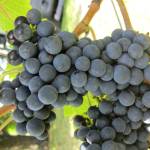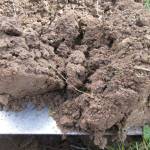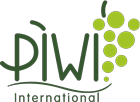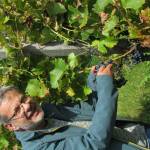Jürgen Amthor, the owner of the 1st probiotic PIWI vineyard in Franconia, is happy about his grape harvest from the PIWI grape variety Cabernet Cortis. The grapes are healthy to 95% and have a very ripe and fruity aroma with a sugar content of 85 ° Oe. The acidity is also very harmonious.

In the downy mildew year of 2021, this is a very good performance, without any use of chemical pesticides. The vines and the soil were treated only with compost tea and effective microorganisms (EM) in October of the previous year and in April of this year.
The entire area of the vineyard is naturally greened and the greening was mowed twice in the summer and the cuttings treated with EM to promote the life of the soil. During a spade diagnosis, viticulture technician Josef Engelhart, who has looked after this vineyard from the start, found that the soil is very loose and deeply rooted up to a depth of 30 cm. There are many earthworms present. The ground smells of fresh herbs and forest soil.

The 10 ares large hobby vineyard was planted in 2017 and treated with EM from then on. In the first few years, Jürgen Amthor occasionally used network sulfur as an ecological crop protection agent in the summer. Since 2020, however, only compost tea and EM have been put on the vines and the soil. The vineyard is therefore 100% probiotic. The microorganisms of the compost tea (approx. 500 different) and the EM (approx. 80 different) enliven the plants and the soil and create a good environment in the vineyard. As a result, the powdery mildew fungi cannot spread to the vine leaves and grapes in a highly damaging manner. The natural resistance to fungi of the PIWI grape variety Cabernet Cortis is supported by the promotion of the "living soil / plant" system. At the end of August, only the stinging shoots at the top of the vines were infected with 30% dried down downy mildew.
Jürgen Amthor from the Eußenheimer Manufaktur treats his vineyard immediately after the harvest and in the coming spring again with compost tea, which he makes himself and also sells to other winemakers. The EM come on the ground as bokashi and together with compost and primary rock flour, also in spring.
More and more winemakers are working with PIWI grape varieties and natural probiotic agents to save pesticides and protect the environment.
Author and copyright Josef Engelhardt - PIWI International


